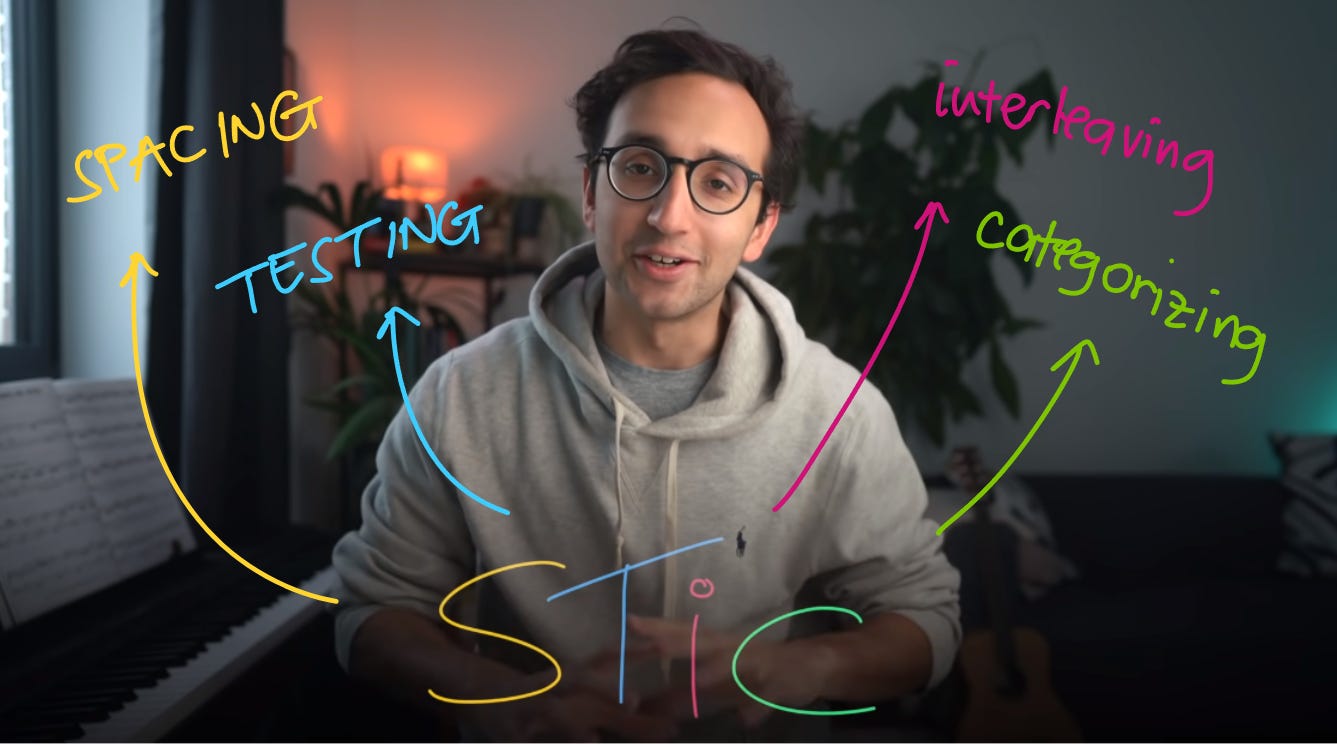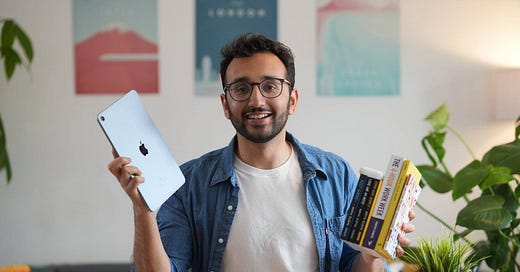You never know how much influence somebody has on you until you enjoy one of their YouTube videos and eventually realize you’ve been following them for 4 years already.
This is the case for me with Ali Abdaal. He’s my most watched YouTuber in the past decade, and for a good reason.
He grew his channel to over 4.8 million subscribers, talking about topics ranging from productivity tips to practically everything on how to live a purposeful life. From study habits to lifestyle to self-improvement, no one else has influenced my life as much as Ali has.
Here are 4 of the most life-changing ideas I learned from the world’s most followed productivity expert.1
📚 The STic Framework
Before, my study habits would revolve around highlighting, taking notes, and rereading textbooks. You know, the study techniques everybody loves to do.
I spent my whole high school life developing these habits. But with a single video, Ali convinced me to completely change the study routine I spent 6 years building.
He cited journals that pointed out the ineffectiveness of the learning techniques we commonly use, urging us to stop doing them. What he offers instead is an evidence-based guide for effective studying which he calls the STic Framework.

Okay, to be completely honest, I think doing all four is a lot of work. I never did it myself. Ever.
BUT Ali does emphasize that if we need to do just one, we should focus on testing. And that’s exactly what I did, which actually worked! Here’s how I generally do it:
Now, it must be said that doing all this takes a lot of cognitive effort, but the knowledge I’d retain is unbelievably around 2X more (there’s no way for me to accurately measure this, but this is honestly how it felt to me) than writing notes or rereading lectures for the same amount of time. Totally worth it.
Oh, and if you’re interested on diving deeper, Ali just recently posted a 3-hour masterclass on how to study for exams. And it’s completely free.
📅 The Ideal Week
It was probably two years ago when I started following Ali more for his self-development videos than for his productivity videos.
I remember during my final year at university I had to juggle my academics with extracurriculars and regular tutorial sessions. There came a time when I could no longer call my parents or hang out with friends because of all the work.
Worse… I could no longer find time to watch anime anymore (it still haunts me to this day).
So I asked myself, “How can I make time for the things that matter to me despite being busy all the time?”
And like an answer to my prayer, Ali released a video introducing The Ideal Week.
In a nutshell, you create your ideal week by plotting in your calendar the kind of week you want to live on a regular basis. Here’s what mine looks like at the moment.
Some might think I’m like a robot for scheduling everything I want to do, but it’s actually quite the opposite. My ideal week gives me freedom to do the things I love doing.
Because here’s the thing. Our life will be made up of hundreds to thousands of ordinary weeks. There are some weeks that are extraordinary, but a large part of them will be ordinary.
Deliberately defining how we want to live these ordinary weeks is our best chance at living life in our own terms. And it’s the best way to avoid living a life full of regrets.
When it comes to time management, the key is not to prioritize what's on your schedule, but to schedule your priorities.
🍀 We are Born Millionaires
This podcast episode is a masterclass in finding happiness. Ali had the chance to interview Mo Gawdat, the former Chief Business Officer of Google X who is now a prolific author on the topic of happiness.
In 2014, Mo unexpectedly lost his son Ali (same name, different person) during a routine medical procedure. The story of Mo and his son still moves me to this day. And his conversation with Ali is one I’ll remember forever.
“Dealing with the loss of a child is a lifetime of grief… To get rid of the pain is impossible… Honestly, if I was given the choice to avoid the pain by not having [Ali], I’d say absolutely not. I’ll take the pain 10 times.” —Mo Gawdat
Each one of us is born a millionaire.
Mo argues that on average, we are all born with around 500,000 hours of active life. If we take each of those hours and multiply them by 60 minutes, it would translate to roughly 30,000,000 minutes. In that way, you’re a millionaire already.
Every minute that you use, you’re exchanging that minute for something else. So like with real money, the question would be how will you spend each of those minutes?
When I was listening to this, I was going through a rough patch in my life. I was isolating myself from everybody in a pitch black room with my things just scattered everywhere. But Mo’s words struck me.
“Do I really want to spend hundreds of my precious minutes lying miserably in bed?” I asked myself.
If the emotions were high and I really needed a break, then yes that would have been perfectly fine. But this was already the third day. I wasn’t replying to messages. I wasn’t eating well. I wasn’t living at all.
Back then, I came to a decision. I decided I’m no longer going to waste any more minutes. I’m going to live again.
So even though my body felt 10 times heavier than usual, I mustered the strength to get up and go for a run. And honestly, everything felt so much better after I did.
✒️ The Odyssey Plan
Journaling is the most powerful tool I have to guide how I live. There’s something profoundly magical about freely writing your thoughts on a page and really reflecting on what you feel and how you think about things.
Ali mentioned that journaling was the main thing that helped him decide to leave medicine to become a full-time creator. I found that interesting, so I wanted to see if it can do the same for me. So I started a journaling habit back in April this year.
But writing freely can sometimes be boring or hard or unhelpful. Thankfully, journaling prompts exist. And my all-time favorite prompt is something called The Odyssey Plan:
I think the questions are absolutely brilliant. If you take the time to reflect on each one of them, I can assure you you’d learn something new about yourself.
To be honest though, this exercise is a bit intense. It took me an hour the first time I did it because I had a lot of thoughts and finding the answer to each question wasn’t easy. But I’d say the effort was worth it.
I discovered something profoundly important about myself. In my journal, I wrote:
If money or other people’s opinions didn’t matter, I’d like to spend a majority of my life learning new things and taking on new experiences.
And you know what, this was ultimately what led me to the decision of leaving behind a career in Mathematics to explore what else life has in store for me, kind of like what happened to Ali.2
All my life, I expected myself to be a teacher, researcher, or maybe even a data scientist after I graduate. But when I discovered that it isn’t a particular domain of knowledge that I find interesting, but the whole experience of discovering new ideas, I just knew I had to dig deeper. And the only way to do that, I thought, is by exploring something I never explored before.
That’s why I’m working in a marketing role despite having zero marketing skills. And that’s why I’m writing consistently for the first time in my life. Both are not easy. There were many moments when I felt uncomfortable and frustrated with all the uncertainty I was feeling.
But right now, I can honestly say I’m glad I made the decision.
And all this never would have happened if I didn’t journal. But more importantly, I don’t think I’ll be the person I am today if I never followed Ali’s work and continuously learned from him all these years.
🧲 My Identity Magnet
When you find someone who shares your principles and exhibits a level of authenticity that you resonate with, it’s good advice to follow their work. Make them your north star—a guide for when you’re not so sure how to navigate the nitty-gritty phases of life.
I believe we all have this thing called an identity magnet. It’s a strange but certain feeling that tells us whether or not we’re drawn to certain people based on our interests, principles, and beliefs.
I didn’t notice it at first, but my identity magnet pulled me closer to Ali. So I followed his work, and before I knew it, I started building my life around the systems and frameworks he freely shared online.
If I had to give credit to anyone for how I’m living my life right now, a large part of that would go to Ali. I hope you find him to be as interesting and inspiring as I have.
This is my 5th weekly essay, and if you’ve been following along the journey, I want to say thank you for being a witness. It means so much to me that you’re here.
I’m currently in my final week at Cohort 11 of Write of Passage. And it has been one hell of a month. I really feel like I’ve grown a lot, even with just the way I write. I’m so excited to see what will happen next.
📌 Before you go:
If you enjoyed this essay, please give it a ❤️ or leave a comment. The additional engagement supports my work (and it makes me happy).
The best way to make my day is by sharing my writing online! There’s a fun button you can press below to do that.
If you’d like to receive stuff like this straight to your inbox, you can subscribe here:
Thank you so much to my Write of Passage peers
, , , and for giving insightful feedback that shaped this essay.The title of the following sections are all hyperlinks to the videos I’m talking about. Feel free to click!












I hope Ali Abdaal gets to see this post, Linart. Aside from the curation of pieces, and how they impacted your life, I see so many gems. My favorite is the concept of the "Identity Magnet". Now I will spend some time considering who my identity magnet is. And your handwriting is captivatingly beautiful!